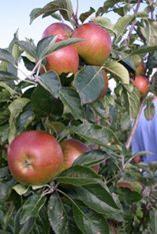

English Cox growers are calling on supermarkets to be flexible on sizing and russet this season.
A combination of the carry-over from last year’s heatwave and a wet and warm period in the last two months will lead to a high proportion of Cox being over the preferred 65mm upper size limit for polybags. Incidences of smooth russeting which fall outside normal parameters are also causing concern.
Steve Maxwell of Worldwide Fruit (WWF) told the Journal: “The average fruit size will be at least 5mm bigger than last year. Last season, around five per cent of the crop was 75mm or above - this season we expect that to rise to about 25 per cent. There will not be enough polybag fruit around. But the key message is that if we keep putting 65s in polybags we will bring down the value of the entire crop. We would like to see customers move count sizes depending on size packed - as long as we sell the same weight of fruit it will be sustainable.”
At this stage, there do not appear to be any internal issues; fruit generally is robust and expected to perform well on-shelf and store well for the latter part of the season.
Smooth russeting is evident on a wide scale and in some orchards there are a high proportion of apples that fall on the cusp of general supermarket specifications.
One grower at a meeting of WWF’s West Country Top Fruit growers in Herefordshire this week raised the concern that “if orchards where as much as 80 per of the apples have a degree ofsmooth russet are going to be turned away, we might as well not pick it. The fruit is just as good, this is just a seasonal variation in the way it appears.”
Maxwell said: “Smooth russet on Cox is pretty unique. It doesn’t reduce the attractiveness or the flavour of the fruit at all, but it isa characteristic of the variety. We would not expect it to cause any concern with consumers.”
The Cox figures released at Prognosfruit earlier this month will need some revision in light of the recent weather conditions.
The crop volume was estimated as 15 per cent lower year-on-year at that stage, but WWF, which markets more than 40 per cent of English Cox, now believes it is more likely to be 10 per cent lighter than in 2003-4.
As a supplier to 740,000 schoolchildren through the National Schools Fruit and Vegetable Scheme, WWF is also on the lookout for small sizes of all varieties. “Sizing is not going to be as big an issue with other varieties. But we have to ensure there are enough 55s available to fulfil our school commitments,” said Maxwell. “"We would like to extend this opportunity to more English growers, so If there are any growers out there with excellent quality, great tasting small fruit, I’d be happy to hear from them.”



